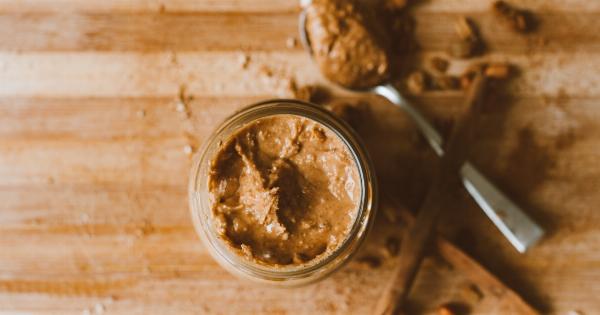When it comes to nut butters, peanut butter is a beloved staple in many households. Not only is it incredibly delicious, but it is also packed with nutrients that make it a healthy choice.
Peanut butter is an excellent source of protein, healthy fats, fiber, vitamins, minerals, and antioxidants.
A Good Source of Protein
Peanut butter is an excellent plant-based source of protein, making it a great option for vegetarians and vegans.
Just two tablespoons of peanut butter contain around 8 grams of protein, which is essential for muscle repair and growth, as well as overall body function. Protein also helps to keep you feeling full and satisfied, making peanut butter a satisfying snack or addition to meals.
Healthy Fats for Heart Health
Contrary to common belief, not all fats are bad for you. Peanut butter contains healthy fats, including monounsaturated and polyunsaturated fats, which are beneficial for heart health.
These fats help to reduce bad cholesterol levels and lower the risk of heart disease. However, it’s essential to consume peanut butter in moderation as it is calorie-dense.
A Good Source of Fiber
Fiber is crucial for a healthy digestive system and can help prevent constipation. Peanut butter contains dietary fiber, which aids in digestion and helps regulate blood sugar levels.
Including peanut butter in your diet can contribute to your daily fiber intake and promote a healthy gut.
Nutrient-Rich
Aside from being a good source of protein, healthy fats, and fiber, peanut butter also contains essential vitamins and minerals. It is rich in vitamin E, which is an antioxidant that protects cells from damage.
Additionally, peanut butter provides minerals like magnesium, potassium, and phosphorus, which play vital roles in overall health.
An Antioxidant Powerhouse
Peanut butter contains antioxidants such as resveratrol, p-coumaric acid, and oleic acid. These antioxidants play a role in reducing inflammation, oxidative stress, and protecting against chronic diseases.
Antioxidants are known for their ability to fight free radicals in the body and promote good health.
Versatile and Delicious
One of the many reasons why peanut butter is a beloved spread is its versatility. From classic PB&J sandwiches to smoothies, dressings, sauces, and baked goods, peanut butter can be used in various ways to add flavor and nutrition to your meals.
It also pairs well with fruits, vegetables, and whole grains, enhancing their taste and providing a satisfying texture.
Healthier Alternatives
While traditional peanut butter is undoubtedly delicious, there are healthier alternatives available, such as almond butter and cashew butter. These alternatives offer similar nutritional benefits, including protein, healthy fats, and fiber.
Almond and cashew butter have slightly different flavor profiles, allowing for some variety and catering to different taste preferences.
Incorporating Peanut Butter Into Your Diet
There are countless ways to incorporate peanut butter into your diet. Here are some ideas:.
1. Spread it on Toast
One of the simplest ways to enjoy peanut butter is to spread it on whole grain toast. This makes for a quick and satisfying breakfast or snack option. You can also add banana slices, chia seeds, or honey for extra flavor and nutrients.
2. Make Peanut Butter Smoothies
Add a spoonful or two of peanut butter to your favorite smoothie recipe for a creamy and protein-packed beverage. Peanut butter pairs well with chocolate, bananas, berries, and even greens like spinach or kale.
3. Use it in Salad Dressings
Peanut butter can be used as a base for homemade salad dressings. It adds creaminess, flavor, and a dose of healthy fats. You can combine it with ingredients like lime juice, soy sauce, ginger, and garlic for a Thai-inspired dressing.
4. Enjoy it with Fruits and Vegetables
Pairing peanut butter with fruits and vegetables is a smart way to enhance their taste while adding valuable nutrients. Dip apple slices, celery sticks, or carrot sticks into peanut butter for a satisfying and nutritious snack.
5. Make Energy Balls or Bars
Peanut butter serves as a fantastic binding agent for homemade energy balls and bars. Mix it with oats, nuts, dried fruits, honey, and seeds. Roll the mixture into bite-sized balls or press them into a pan to create bars.
6. Whip Up Peanut Sauce
If you enjoy Asian cuisine, you can create a delectable peanut sauce using peanut butter. Mix it with soy sauce, sesame oil, garlic, and a dash of honey.
Use it as a dip for spring rolls, drizzle it over stir-fries, or use it as a dressing for cold noodle salads.
7. Add it to Baked Goods
Peanut butter can elevate your baked goods, such as cookies, brownies, and cakes. It adds moisture and a delightful nutty flavor.
Look for recipes that incorporate peanut butter, or simply add a dollop to your favorite chocolate chip cookie dough for an extra special treat.
Conclusion
Peanut butter is not only a delicious and versatile spread, but it also offers numerous health benefits.
From its high protein content to its healthy fats, fiber, and antioxidant content, peanut butter is a nutritious choice that can be enjoyed in various ways. Incorporating peanut butter into your diet can enhance the taste and nutritional value of your meals, and open up a world of culinary possibilities. So go ahead, grab a jar of peanut butter, and explore the endless deliciousness it has to offer!.






























